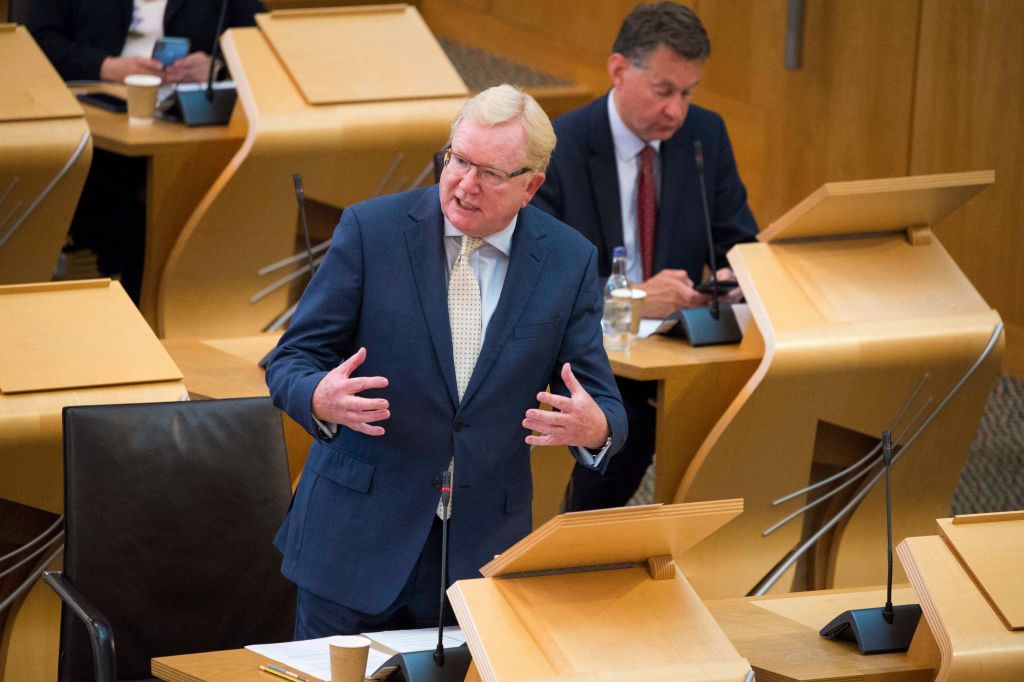The Scottish Conservatives are now in crisis. Jackson Carlaw has resigned six months into his leadership and less than a year on from Ruth Davidson’s departure. The party is polling 35 points behind the SNP with another Scottish Parliament election due next May and a string of polls have shown a majority of Scots are now in favour of Scexit. Carlaw accepts that he is not the man to turn this around, but it is not entirely clear who is. There are few on the Scottish Conservative benches at Holyrood capable of taking on Nicola Sturgeon. The Tories might have to look beyond the confines of the Edinburgh assembly for their next leader.
Carlaw’s leadership was credible at first. He stepped in when Ruth Davidson quit last August and served six months in an interim capacity. Although the Scottish Tories lost half their seats in the December election, it is generally agreed that they started the campaign in a much worse position. Carlaw also stood firm against attempts by Sturgeon to stir up grievance for another referendum on Scotland leaving the UK. But his victory in the February leadership contest coincided with the onset of Covid-19 and his collegial approach was unpopular with the Tory grassroots. While Carlaw tried to contribute to a cross-party consensus, the SNP leader did not set aside her own partisanship. The public rewarded her for it, with polling indicating that three-quarters of Scots back her response to the virus, despite a litany of failings.
According to sources I’ve spoken with, criticism of his leadership style had progressively gotten to Carlaw. I was one of those critics, not least on Carlaw’s inability to hold Sturgeon to account with anything like Ruth Davidson’s finesse, and his mishandling of the Dominic Cummings row. But there is no doubt that he was a dedicated servant of his party. He just wasn’t the right man for the job at this time.
As I have droned on about for years now, with the generous tolerance of Spectator readers, the 2014 referendum didn’t settle the question of Scottish secession. Superficially, the Nationalists accepted the result but in truth they simply continued their war of attrition against the Union, using the parliament New Labour built for them as their Trojan horse. The Tories’ failure to appreciate just how much power devolution has handed to the separatists – with many of those powers given away by the Tories themselves – has brought the Union to the brink of dissolution. Were the wreckers to succeed, it would mean more than running a new flag above Buckingham Palace. Scottish secession is an economic, diplomatic and national security threat to the United Kingdom.
The Prime Minister and the UK Tory Party cannot be seen to interfere too much in the process for choosing Carlaw’s successor but they must take note of the task he or she will inherit. The Scottish Conservatives will have to be picked up, given an almighty shot in the arm, and rebuilt as a dominant pro-Union party, edging out Scottish Labour and the Lib Dems while devising an offer that can appeal to those 2014 No voters now streaming in the direction of the SNP and separatism.
Where Boris can do the most good for his next man or woman north of the border is in grasping the thistle of the constitution. Devolution was designed to institutionalise Labour’s Scottish fiefdom; instead it has created for the SNP a proto-state from which to propel their movement to its ultimate goal. Every day devolution remains unreformed is another day closer to the end of the Union. The Prime Minister is a student of history. He doesn’t need me to tell him how he will be judged if he presides over such an eventuality. The next Scottish Tory leader will spend most of his or her time fighting for the Union and so will the next and the next and the next after that. Only when independence is no longer a daily threat will the Union be secure and the governance and politics of Scotland be able to climb out of the constitutional sinkhole.
The best chance of beginning that process is by legislating for a constitutional arrangement that encourages national unity rather than empowering the forces seeking to destroy it. There is no obligation for a country to cooperate in its own undoing. There are times when the Union being in peril hurts the Scottish Tories and times when it helps, but being in peril always hurts the Union. The Scottish Tories don’t matter all that much, but the Union does. Boris Johnson must recognise that it is not only his Scottish party that is in crisis, but his country.







Comments